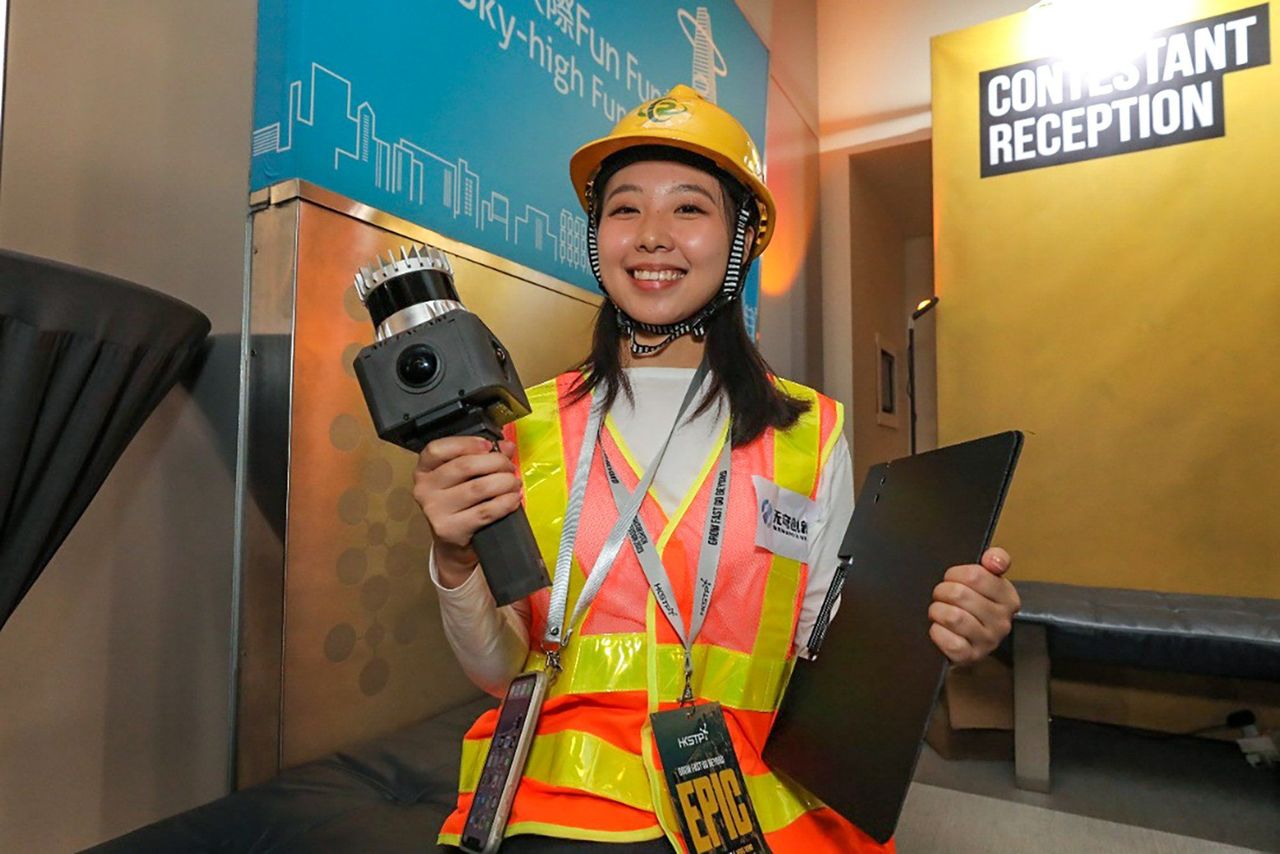Hong Kong News

Local team wins flagship Hong Kong pitch event with handheld 3D modelling robot
A young team of Hong Kong university students and entrepreneurs, who have developed a handheld 3D modelling tool and software, won US$90,000 at the Hong Kong Science and Technology Park’s (HKSTP) 7th annual Elevator Pitch Competition (EPiC) on Friday.
The event judges, consisting of entrepreneurs, investors, and officials from the city, determined that the start-up, Skyland Innovation, had bested more than 610 start-ups from over 55 countries that entered the competition.
Skyland – which mainly comprises around 50 students from mainland China attending Hong Kong universities – was founded in April 2021 and aims to help property owners and contractors easily model and evaluate existing building structures through robotics and artificial intelligence (AI) software.
 Jessy Wang from Skyland Innovation, overall champion and PropTech winner at EPiC 2023.
Jessy Wang from Skyland Innovation, overall champion and PropTech winner at EPiC 2023.
“Epic has been a gateway for us to learn and network at a very fast speed … I hope our victory will motivate more university students like us,” said Jessie Wang, the start-up’s human resources business partner, who delivered Skyland Innovation’s pitch sporting the company’s latest handheld modelling tool.
“Next, we’re hoping to attract more VC [venture capital] attention, and we’ll be able to turn this into our full-time employment, grow the team, and go deeper into our AI algorithm development,” added Wang. According to the company’s pitch, the AI algorithm will allow the modelling device to estimate and provide additional information about building structures.
Last year’s EPiC winner was Hong Kong-based marine technology start-up archiREEF, which develops 3D-printed tiles for sea beds that help re-grow and maintain coral reefs. Vriko Yu Pik-fan, co-founder and CEO of Archireef, said that winning the competition helped attract investors and collaborators to the firm. It has since expanded to the United Emirates and netted millions in sales.
Skyland Innovation has already benefited from HKSTP, a public institution the Hong Kong government set up to foster innovation and technology development. The team got its start through the Hong Kong Centre for Construction Robotics (HKCRC), established by Professor Zexiang Li from Hong Kong University of Science and Technology (HKUST) in 2020.
In remarks at the event, Hong Kong’s Financial Secretary, Paul Chan Mo-po, said the competition was an example of the city’s growing entrepreneurial scene.
“Hong Kong has a thriving start-up ecosystem with 4,000 start-ups, up more than 50 per cent from 2018 … The city is also a natural gateway to the Greater Bay Area, which offers tremendous growth opportunities,” said Chan.
Professor Li previously mentored and incubated HKUST robotics student Frank Wang, who founded the global market-leading civilian drone manufacturing company DJI in 2016. Skyland Innovation says it was one of the earliest HKCRC incubation teams and has already raised millions of Hong Kong dollars in seed investment and worked on over 50 projects in the Greater Bay Area.
With most team members coming from mainland China, representatives said that HKSTP’s support and favourable Greater Bay Area policies led to them staying in Hong Kong to launch their start-up.
Though the event’s winners are local products of city-funded programmes, about 75 per cent of EPiC’s contestants came from abroad this year, a record high proportion since 2016, said HKSTP. The event occurred as the city continues its fightback from several years of Covid-19-related travel restrictions.
The EPiC grand finale, which included 50 semi-finalists, was held at the city’s International Commerce Centre and covered two themes, FinTech and PropTech. The Financial Crime Testing & Machine Learning Training start-up FinCrime Dynamics from the UK was named as the overall FinTech category winner, earning US$30,000, while the other top 10 overall finalists won US$10,000 each.
All 50 semi-finalists qualify to be considered by the HKSTP Venture Fund for additional investment deals up to a maximum investment of US$5 million.











